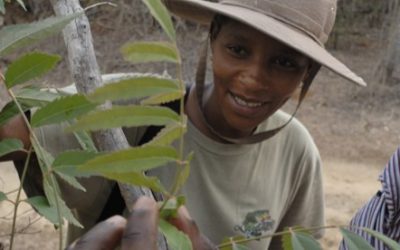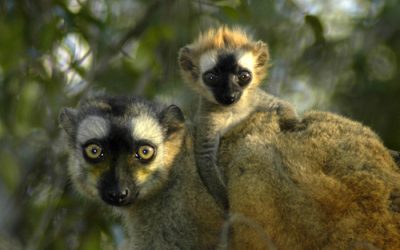At the heart of Madagascar’s capital city, 23 conservation managers convened for a 2-day CEPF experience sharing event in November 2019 to share their project impacts and lessons learned. The managers represented 21 Civil Society Organizations (CSO) from Madagascar, Comoros, Mauritius and Seychelles – the islands that make up the Madagascar and Indian Ocean Islands Hotspot. The meeting served as a key step towards building the CSOs efforts in amplifying their work for greater conservation impact ranging from mangrove restoration to waste management and forest restoration,.
The event marked the end of a CEPF-funded project led by the Tropical Biology Association (TBA) in collaboration with Madagasikara Voakajy, which strengthened the capacity of conservation CSOs working in the Madagascar and Indian Ocean Islands Hotspot. Spanning 2 years, the project held 2 master classes, 6 learning exchanges, and 11 mentoring visits. With a total of 52 conservation managers trained, the project enhanced the organizational capacity of 39 CSOs.
“The event was an important opportunity for the CSOs to explore how they can collaborate to have more impact in conservation of the hotspot. It was also an engaging platform to identify the impacts of our training and for participants to share their project successes and challenges. ” said TBA Director, Dr Rosie Trevelyan.
Participants highlighted the achievements they made after their trainings: such as writing successful funding proposals,a rise in community involvement in conservation projects, increase in gender inclusivity through establishing women resource user groups,and increased confidence and organizational teamwork.
Ravoson Nalimanitra from Code Menabe-Madagascar explained that “From the TBA master class I attended, I learned not just how to write a proposal but also how to convince the funder that my project will have tangible benefit for natural resources. Since the master class, I have written 4 new funding proposals with 3 of them being successful. The training also instilled a culture of reflecting on our organizational performance and sharing knowledge”
Lalarisoa Rakotoarimino from C3 Madagascar also added that “The one thing that really hit me from the site visit and learning exchange I attended is that we need to practically understand our projects on the ground. From the exchange, I witnessed concrete examples of good practices and learnt some great methods of community mobilization and engagement which I implemented in our project”
The participants identified these training impacts as major contributing factors towards their own project impacts such as, an increase in number of protected areas conserved in the region, an improvement in the management methods of key biodiversity areas, as well as an increase in livelihood opportunities for the local communities which in turn increased their conservation involvement.
The event provided the participants with an opportunity to discuss lessons learnt from their project cycles. They highlighted the importance of involving all stakeholders right from the initial project design stages; defining efficient communication channels to present their results; and identifying organizations with aligned goals with whom they can easily collaborate with.
Looking ahead, the participants shared their future conservation goals for the hotspot and how they will set about to achieve them. These goals included, reinforcing sustainable marine fishing practices, lobbying for the integration of conservation into governance and development, and enhancing community involvement in conservation. A major takeaway on this was the realization that forming strong partnerships and collaborations is essential for the CSOs to realize their sustainability goals.
Despite the end of the project, the participants still continue to inspire each other and share best practices and results through their MACOMAUSEY WhatsApp network (Madagascar, Comoros, Mauritius and Seychelles), .
“This event was highly needed. It encouraged me to strengthen my efforts towards looking into new partnerships and collaborations for our projects”
Daksh Beeharry, Mauritius
“I had the opportunity to interact with others who have benefited from this CEPF project through this experience sharing. It was an eye-opener towards understanding and sharing project challenges while also borrowing best practices shared by other participants from their lessons learned”
Vanessa Didon, Seychelles






